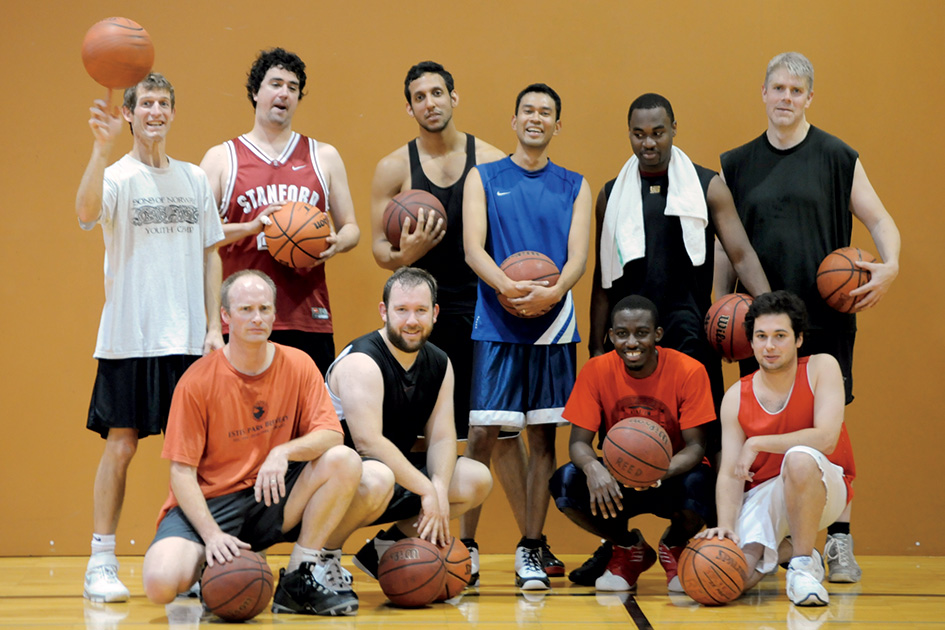Bouncing off the Walls
The warning horn sounded, the referees were ready, and it was time for the annual student vs. alumni game. The starting five for the alumni team headed to the court in the Watzek Sports Center stripped to the waist (due to a uniform mix-up, we had the indignity of playing as “skins”). None of us really wanted to be embarrassed by going head-to-head against the lanky spring-legged student facing us in the jump ball circle. After some brief finger pointing, Imran Ahmad ’04 resignedly ambled up to perfunctorily lose the jumpball, and the game was underway.
The Griffins (that’s the student team for those of you with short memories) scored first, slowing the pace as they tried to employ the offensive strategy instilled by new coach Mario De Ieso. Despite occasional bursts of superior speed and athleticism, their attack suffered from a lack of cohesiveness and apparent first-game jitters.
The alumni didn’t do much to take advantage of our opportunities. Missed shots and deflected passes marred the early going, and a marked lack of conditioning made itself readily apparent as we huffed and puffed our way up and down the court. An appalling stretch of missed free throws didn’t help matters. But then a couple of three-pointers by Jonathan Donehower ’05 and Colin Daniel ’01 brought us to within one point, 17–16, at halftime.
This traditional November season-opener for the Reed Griffins goes back to the late 1990s. It serves to break the team in for a spiritually uplifting schedule which includes Mt. Angel Seminary, Multnomah Bible College, and Reed’s perpetual arch-nemesis, Eugene Bible College—a rivalry which survived an infamous mock crucifixion in the mid-nineties.
But student/faculty games and student/alumni games go back much farther than that. The 1921 Griffin, for example, describes an intramural basketball tournament between teams of freshmen, sophomores, juniors, seniors, and distinguished professors—who apparently did not distinguish themselves on the court. “The faculty, after suffering two defeats, were forced to withdraw from the tournament, and the victories scored over them by the Freshmen and Sophomores were not counted in the final reckoning.” (The Seniors won the final game, “trampling rough shod over the Freshmen aggregation,” 32–25.)
When I played for the Griffins in the late eighties, I remember vividly the closing moments of a hard-fought contest against a combined faculty/staff team. Clinging to a one-point lead in the waning moments, my ill-advised outlet pass to a breaking John Holcomb ’92 was stolen by Johnny the security guard, and biology professor David Dalton sank a long, improbable moonshot at the buzzer to beat us by one. A tough loss, no doubt, but I remember marveling that nowhere else could a college basketball team possibly lose to their professors.
Now that I play for the alumni, my primary goal for the game against the students is not getting run out of the gym.
The Griffins came out of halftime with a vengeance. Matt Edwards’12 and Isaac Eger ’11 flashed along the baseline, working through our zone defense to score lay-ups. The students extended their lead to double digits, and it seemed like the game was going to turn into another comfortable win for the younger side—as it often does.
Then Coach De Ieso went to deep into his bench. Fourteen students suited up in uniform, and they all got a chance to play (eleven scored). And while the starters sat out, the alumni mounted our comeback. Imran Ahmad ’04 went to work, scoring from inside and out. The students fouled, but now the free throws were going in. By the time the starters were sent back in to salvage matters, the tide had turned. A late three-pointer brought the students close, but clutch free throws by the alumni down the stretch provided the winning margin 42—40.
As we sauntered to the locker room, exchanging high fives, griping about aching muscles and sore knees, it was tempting to conclude that experience and guile had triumphed over youth and energy. But I’m not so sure. We were lucky that Coach De Ieso didn’t go for the jugular. In fact, I felt lucky just to be able to participate. The Griffins had their whole season—their whole lives, really—in front of them. For the alumni, this was one of our limited opportunities to show that we still had something. Basketball is a game for the young, and time is not on our side.
